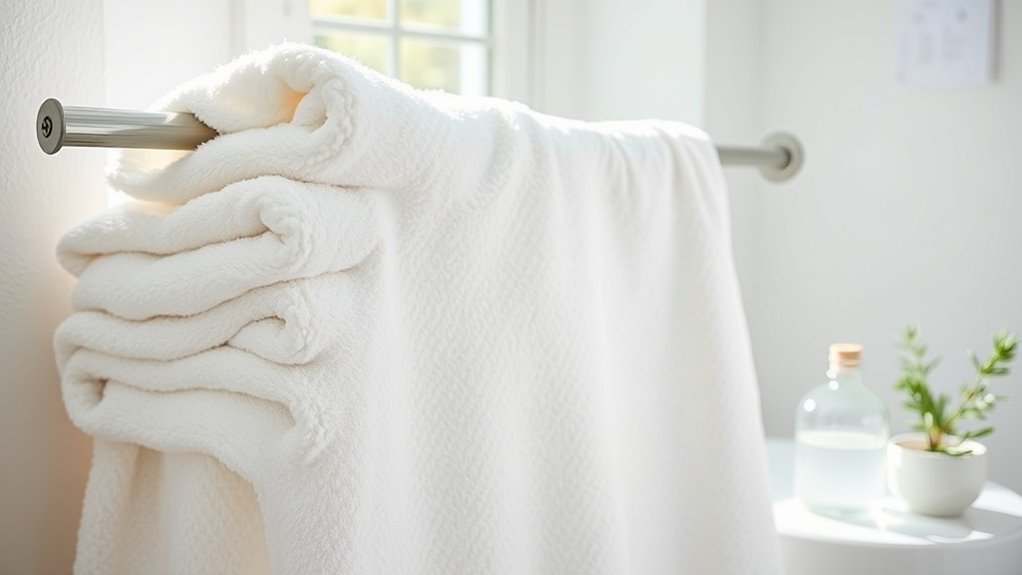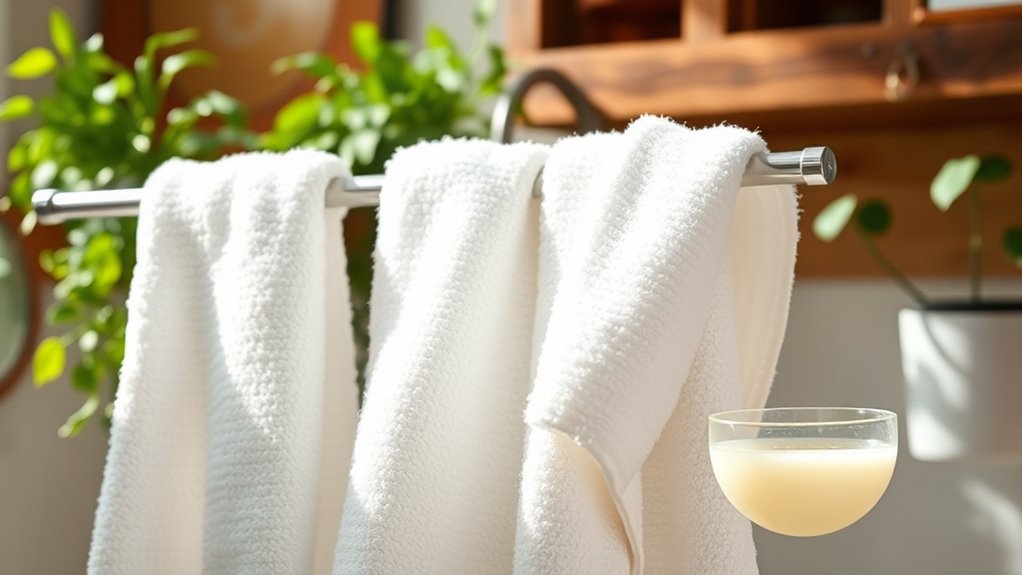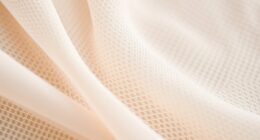To banish mildew smells from towels, use one surprising kitchen ingredient—white vinegar. Add half a cup of vinegar to your rinse cycle to break down soap scum and bacteria that cause musty odors. Vinegar naturally balances the laundry water’s pH and helps kill mold spores, leaving your towels fresh and odor-free. For more tips on keeping your towels smelling great and preventing future issues, discover what else vinegar can do.
Key Takeaways
- White vinegar effectively neutralizes mildew odors and breaks down mold spores in towels.
- Add half a cup of white vinegar during the rinse cycle to eliminate musty smells naturally.
- Using vinegar regularly helps prevent mildew buildup and maintains towel freshness over time.
- Vinegar’s acidity kills bacteria and mold without harsh chemicals, making it a safe, kitchen-based solution.
- Combine vinegar with proper air drying and ventilation for best results in banishing mildew odors.

Mildew odors can quickly turn fresh towels into unpleasant reminders of moisture and neglect. If you’ve noticed that your towels smell musty even after washing, you’re not alone. The good news is, you don’t need harsh chemicals or special products to banish that smell. Sometimes, simple household items can do the trick. One surprisingly effective kitchen ingredient for removing mildew smells is white vinegar, which works wonders in combination with proper air drying techniques and fabric softeners.
When tackling mildew smells, start by re-evaluating your air drying techniques. Towels need to be completely dry to prevent mold and mildew growth. Instead of leaving them damp or crammed into a laundry basket, hang them in a well-ventilated area where air circulates freely. Sunlight also helps kill bacteria and mold spores, so if possible, dry your towels outside on a sunny day. If outdoor drying isn’t an option, ensure your bathroom or laundry area has good ventilation. Using a fan or opening windows during and after drying can considerably reduce moisture buildup, preventing that musty smell from settling in.
Proper air drying and ventilation prevent mildew odors in towels.
Next, consider your laundry routine and the role of fabric softeners. While fabric softeners can add a fresh scent and make towels feel softer, they can also leave a residue that traps moisture and promotes mildew if not used carefully. To avoid this, use fabric softeners sparingly or opt for natural alternatives, like vinegar, that won’t leave behind residues. Adding half a cup of white vinegar during the rinse cycle can help break down soap scum and remove odor-causing bacteria. Vinegar also balances the pH of your laundry water, making it less hospitable for mold growth. Follow this by a thorough drying process, ensuring your towels are entirely dry before folding or storing.
Once your towels are clean, and you’ve improved your air drying methods, you can take additional steps to keep mildew at bay. Occasionally washing your towels with vinegar or a cup of baking soda can refresh them and eliminate lingering odors. Avoid overloading your washing machine, as crowded loads prevent thorough rinsing and drying. If you’re battling persistent smells, consider running an extra rinse cycle or using a commercial mildew remover, but vinegar remains a simple, natural, and cost-effective solution.
Frequently Asked Questions
Can Lemon Juice Remove Mildew Odors From Towels?
Lemon juice can effectively remove mildew odors from towels through lemon cleaning, a natural and eco-friendly kitchen remedy. You simply soak your towels in a mixture of lemon juice and water or add lemon to your laundry cycle. The acidity helps break down mildew spores and neutralize odors. Using lemon as a kitchen remedy is a fresh, safe way to keep your towels smelling clean without harsh chemicals.
How Often Should I Wash Towels to Prevent Mildew?
Think of your towels like a garden that needs regular tending. To prevent mildew, you should wash your towels every three to four uses, especially if they’re damp or haven’t dried completely. Good towel drying habits and consistent laundry frequency tips keep mildew at bay. By staying proactive, you guarantee fresh, odor-free towels, turning laundry day into a simple task rather than a dreaded chore.
Is Baking Soda Safe for All Fabric Types?
You might wonder if baking soda is safe for all fabric types, especially when it comes to fabric dyeing or stain removal techniques. Generally, baking soda is gentle and safe for most fabrics, but it’s best to test a small hidden area first. For delicate or colored fabrics, use a diluted solution to avoid any potential fading or damage. Always follow care labels and wash instructions to keep your textiles in good shape.
Can Vinegar Damage Towel Fibers Over Time?
You might wonder if vinegar fabric can impair towel fibers over time. Using vinegar on towels is generally safe when diluted properly, as it helps eliminate odors without harming the fibers. However, using pure or excessive vinegar can weaken towel fibers over time. To protect your towels, dilute vinegar with water and avoid overdoing it. Proper rinsing ensures your towels stay fresh without risking fiber damage.
Are There Natural Alternatives to Kitchen Ingredients for Odor Removal?
You’re wondering if natural alternatives can replace commercial deodorizers for odor removal. Essential oils, like tea tree or lavender, are great options—they’re natural, smell fresh, and can be added to laundry or sprinkled on towels. Unlike commercial deodorizers, they don’t contain harsh chemicals and are safe for your skin. Plus, they give your towels a pleasant scent, making your laundry routine more eco-friendly and enjoyable.
Conclusion
Say goodbye to mildew smells like clearing fog from a window—suddenly everything feels fresh and bright. With just this simple kitchen ingredient, you can turn your towels from stinky to pristine, restoring their softness and scent. It’s a small change that makes a big difference, transforming your laundry routine into a breeze. So, next time odors linger, remember you hold the secret to a fresher, cleaner towel in your kitchen.









